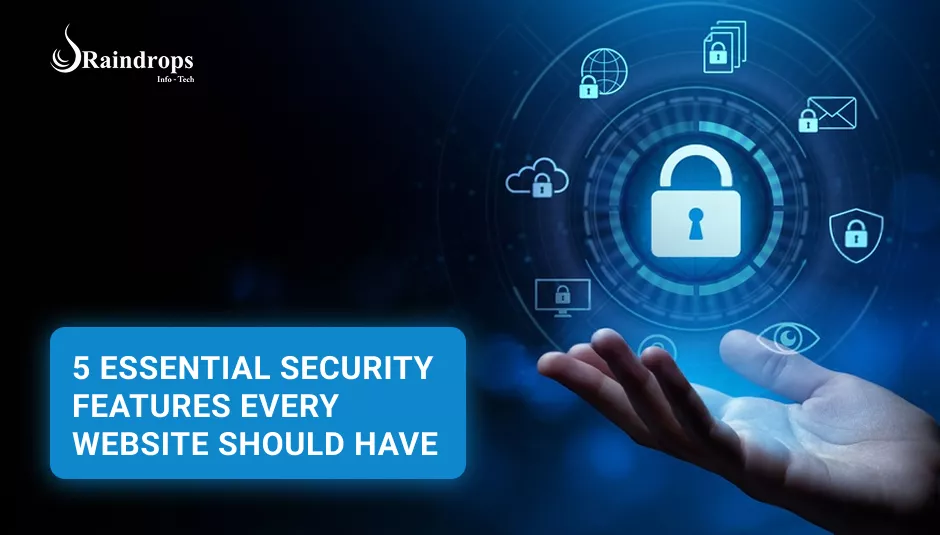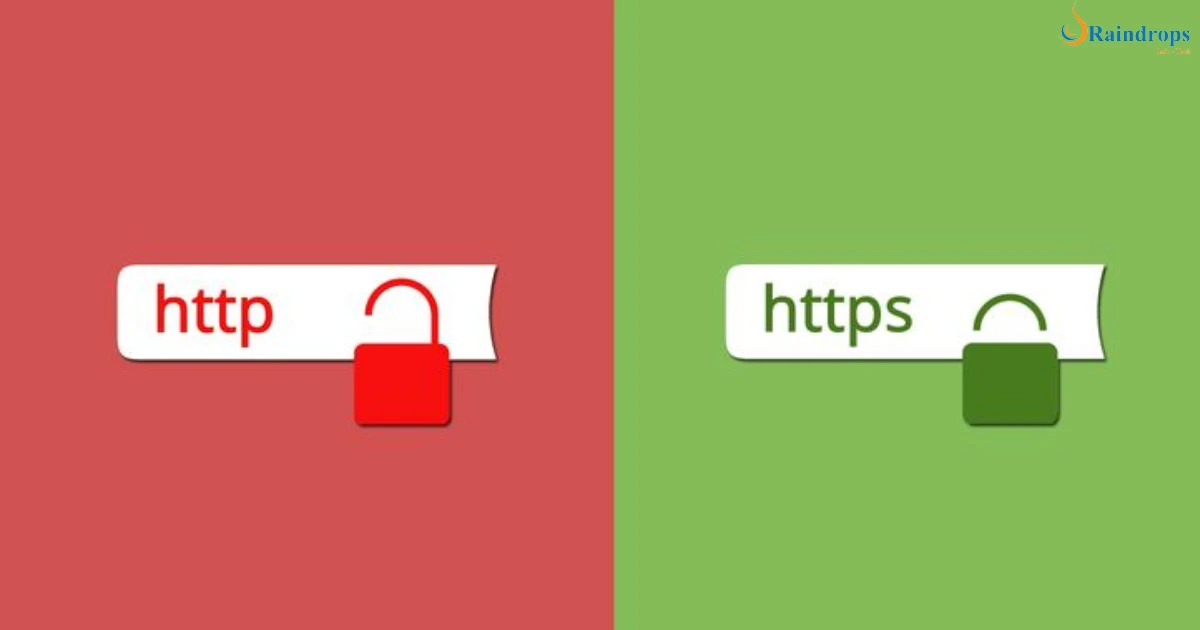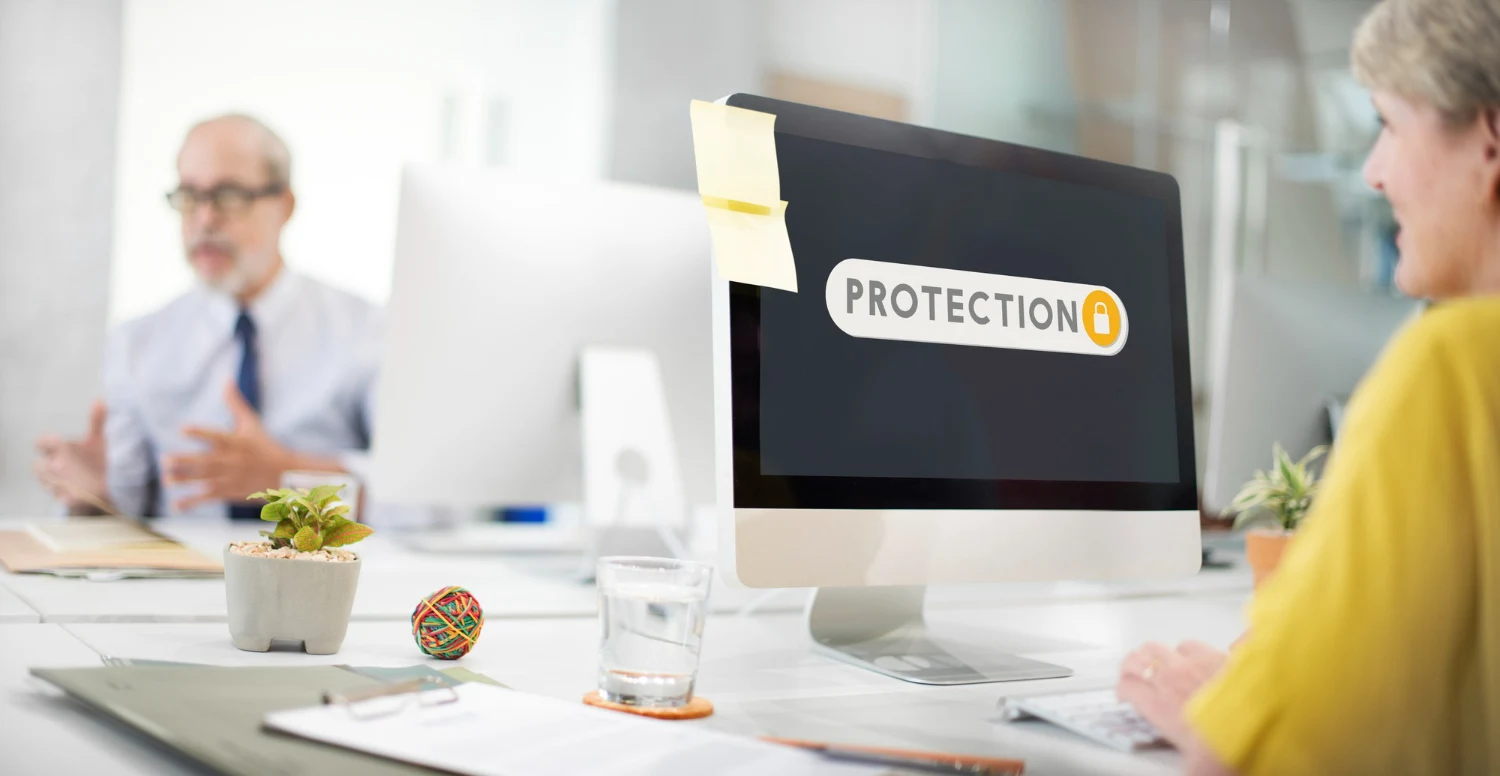If you own a website or you’re planning to build one, there’s one thing you can’t afford to ignore: security.
Think about it. You’ve worked hard to build your website. Maybe it’s your business, your brand, or your blog. But in just one weak moment, an outdated plugin, a missed update, a simple password and your entire site can get hacked, shut down, or worse…stolen.
And no, website security isn’t just a “big company” problem. Hackers often target small websites because they assume security is weak.
This blog is for you, whether you’re a small business owner, startup founder, freelancer, or developer. We’re going to walk through 5 essential website security features that every site should have. Let’s keep your site safe, and your peace of mind intact.

1. SSL Certificate: Encrypting Data for Safe Communication
If your website doesn’t have an SSL certificate yet, you’re taking a big risk. An SSL (Secure Sockets Layer) certificate is one of the most basic and essential website security features every site must have today. It creates a secure, encrypted connection between your website and its visitors so no third party can snoop on the information being exchanged.
Whether it’s login credentials, contact forms, or payment details—an SSL certificate for your website keeps everything private.


Why It’s Essential:
-
Data Protection: SSL encryption makes sure that any information shared on your website can’t be read or stolen by hackers.
-
Trust Signal: Ever seen that padlock symbol in the browser bar? That shows your site is using HTTPS and has an SSL certificate—users trust sites that have it.
-
SEO Advantage: Google gives ranking preference to secure sites. So if you’re wondering how to secure a website and improve SEO, this is your first step.
How to Implement:
-
Purchase an SSL certificate from a trusted provider like Let’s Encrypt, GoDaddy, or Comodo. Some hosting providers even offer it for free.
-
Install it on your server (or ask your hosting provider to do it for you—it’s usually quick).
-
Update your site URLs to use https:// instead of http://. Make sure all internal links and assets (like images and scripts) are updated too.
2. Strong Password Policies: The First Line of Defense
You wouldn’t leave your house door open, right? Then why leave your website’s backend vulnerable with weak passwords? A strong password policy for websites is your first line of defense against unauthorized access, brute force attacks, and bots trying to sneak into your admin dashboard.
A surprising number of websites still use passwords like “admin123” or “password@123”. These are the first things hackers try.
Best Practices to Follow:
-
Complexity: Use a mix of uppercase, lowercase, numbers, and special characters. For example: Gr!dS3cuR3!2025
-
Length: Go for at least 12–16 characters. Longer is always better.
-
Uniqueness: Every login should have its own password. Don’t reuse passwords from your email or other platforms.
-
Change Regularly: Set reminders to update passwords every 60–90 days. Yes, it’s a bit of a hassle—but it’s worth it.

Bonus: Add Two-Factor Authentication (2FA)
2FA is a simple but powerful tool that adds an extra layer of security. Even if someone figures out your password, they still can’t log in without a second code—usually sent to your phone or generated by an app like Google Authenticator.
Why it matters: In today’s digital world, where cyberattacks are common, just having a strong password isn’t enough. Adding 2FA significantly reduces the chances of unauthorized access.
3. Regular Software Updates
Still running your website on an old plugin version or a theme you installed years ago? That’s like leaving your front door unlocked.
Outdated software is one of the biggest reasons websites get hacked. Whether it’s your CMS (like WordPress), plugins, themes, or even custom scripts—every outdated component can become an open invitation for attackers.
Hackers are always on the lookout for known bugs or weaknesses in older versions. Once these vulnerabilities are exposed online (and they often are), it’s only a matter of time before bots come knocking on your site.
Why It’s Important:
-
Security Fixes: Updates often patch known issues that could be exploited by attackers.
-
Speed & Performance: New versions usually come with optimizations that make your website load faster and work smoother.
-
Compatibility: Updated plugins/themes are more likely to work well with each other and newer browsers, avoiding website crashes.

What You Can Do:
-
Enable auto-updates: Many CMS platforms allow automatic updates for plugins and themes—use them!
-
Set a weekly reminder to manually check for updates, especially if you’re using custom tools.
-
Delete what you don’t use: Unused plugins or themes can still become attack points—even if they’re inactive.
4.Web Application Firewall (WAF): Shielding Your Website from Bad Traffic
Imagine if you could have a bouncer standing at your website’s front door, checking every visitor before they get in. That’s exactly what a Web Application Firewall (WAF) does.
It sits between your website and the internet, watching every request and blocking anything suspicious before it can reach your site. WAF security for websites is no longer a luxury—it’s a must-have if you’re serious about protection.
Why It’s Powerful:
-
Real-Time Protection: It detects and blocks common threats like SQL injections, cross-site scripting (XSS), and malicious bots on the spot.
-
Stops DDoS Attacks: A WAF can prevent your website from being overwhelmed by fake traffic trying to crash it.
-
Custom Rules: You can create filters based on your site’s unique needs (e.g., block traffic from certain countries or IPs).

How to Set It Up:
-
Choose a trusted provider like Cloudflare, Sucuri, or Astra Security.
-
Follow their setup guide (most just require changing your DNS settings—it’s simpler than it sounds).
-
Regularly check your firewall logs. They’ll show you what’s being blocked and help you adjust settings if needed.
5. Regular Backups: Your Emergency Button When Things Go Wrong
You’ve installed security plugins. Your passwords are strong. You’ve got an SSL. But here’s the truth: even the most secure websites can get hit. And when they do, having a regular backup can be the difference between disaster and recovery.
Think of backups like your website’s “undo” button. Something went wrong? Restore your latest backup, and you’re back in business.
Why It’s a Must:
-
Accidental Errors: Sometimes it’s not hackers—someone on your team might delete something by mistake.
-
Hack Recovery: If you do get hacked, a clean backup helps you restore your site without paying ransom or starting from scratch.
-
Peace of Mind: Knowing you have a safe copy means you can fix issues faster and with less stress.

Smart Backup Strategies:
-
Frequency: Backup daily if your site changes often (like an eCommerce store or blog). Weekly is okay for static sites.
-
Storage: Never keep all your backups in one place. Use cloud storage (like Google Drive or Dropbox) AND a local copy.
-
Automation: Use tools like UpdraftPlus, BlogVault, or Jetpack for WordPress to automate the process.
-
Test Your Backups: Every few months, actually try restoring from a backup. Don’t wait until an emergency to find out it doesn’t work.
Final Thoughts: Website Security Isn’t Optional Anymore
Let’s face it, no matter how beautiful or fast your website is, if it’s not secure, it’s vulnerable.
In today’s world, cyber threats don’t knock before entering. Whether you’re running a personal blog, an online store, or a business site, these five essential website security features—SSL certificates, strong passwords, regular updates, firewalls, and backups aren’t just “nice to have.” They’re non-negotiable.
And here’s the good news, you don’t have to figure it all out alone.
At Raindrops Infotech, we help businesses like yours build websites that are not only stunning but also rock-solid secure. From setting up SSLs to configuring advanced firewalls and automated backups, we’ve got your back.
Want a secure, fast, and future-ready website? Let’s make it happen, contact us today and get your free consultation.
FAQs
Q1. What are the most important security features a website must have?
A secure website must have an SSL certificate, strong password policies, regular software updates, a web application firewall (WAF), and regular backups.
Q2. Why is an SSL certificate important for my website?
It encrypts data transferred between your site and users, keeps sensitive info private, and improves trust and SEO rankings.
Q3. How can I secure my website from hackers?
Use strong passwords, update software regularly, install a WAF, enable 2FA, and back up your data frequently.
Q4. What is a web application firewall (WAF)?
A WAF protects your website by blocking malicious traffic, DDoS attacks, and harmful scripts like SQL injection or cross-site scripting.
Q5. How often should I back up my website?
If your site changes frequently, daily backups are best. At a minimum, back up weekly and before major updates.
